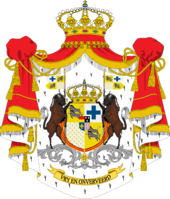Kingdom of Natal
This article refers to a micronation or element of micronationalism which is defunct and no longer exists. You can help make the article reflect that or ask on the talk page for further information. |
| Kingdom of Natal Koninkryk van Natal | |||
| |||
| Motto VRY EN ONVERVEERD Anthem The Return | |||
Greater coat of arms | |||
| Capital | Koningswyk | ||
|---|---|---|---|
| Demonym | • Natalian • Bregentine | ||
| Official language | • English • Afrikaans • Dutch | ||
| Official religion | Anglo-Catholicism | ||
| Government | Absolute monarchy | ||
| - Sovereign | HRAM Brooklyn I, Queen of Natal | ||
| - Lord High Chancellor | Duke Bradley van Dullahan | ||
| Legislature | Koninklike Vergadering | ||
| Formation | - | ||
| - Province of Hobartstown and Victoria | 21 July 2014 | ||
| - Dissolution of Hobartstown and Victoria | 9 August 2014 | ||
| Area | N/A | ||
| Population | 23 (2014) | ||
| CGSC (2014) | 3.2 high | ||
| Currency | Natalian guilder | ||
| Time zone | N/A | ||
| National animal | Wildebeest | ||
| Patron saint | King Charles the Martyr | ||
The Kingdom of Natal was a self-proclaimed sovereign nation which existed as an exercise in absolute monarchism and Afrikaner and English culture. The Kingdom of Natal claimed no physical territory, and as such self-classified as a nation rather than a state. Natal was ruled over by a Queen, Her Royal and Apostolic Majesty Brooklyn I. Its legislative body was the Koninklike Vergadering, and the Kingdom's reigning house was the House of Emmanuel.
As of 2019, Natal appears to have been dissolved.
Etymology
Natal was named for the South African province and former Boer republic of KwaZulu-Natal. The name "Natal" was given to that land by Portuguese explorer Vasco de Gama, who first saw its coast on Christmas Day 1497 (Natal being the Portuguese word for Christmas). The choice of the name "Natal" for the then Bregentine province was an example of the Anglo-Dutch and Afrikaner culture of Hobartstown and Victoria.
History
The Dukedom of Natal was established on 21 July 2014 by a royal proclamation of Jonathan, Sovereign of the Commonwealth of Hobartstown and Victoria and Grand Duke of the Bregne. Brooklyn Emmanuel de Chavannes, a Victorian aristocrat and politician from the Province of Natal, was declared a Princess of the Bregentines and the Duchess of Natal, with the style of Royal Highness. By virtue of gaining the Patriciate - the Victorian equivalent of a Peerage - Brooklyn Emmanuel was granted a seat on the House of Patricians, and was later elected Speaker of the House. The Duchess was also named Bishop of Natal and Cardinal Rector of the Church of Saint Mary Magdalene, establishing the precedent of the Natalian Monarch's authority over the Church of Natal.
On 8 August 2014, the Dukedom of Natal was elevated to a Grand Dukedom, with Brooklyn Emmanuel becoming Grand Duchess of Natal. The next day, the Parliament of the Commonwealth passed an Act dissolving Hobartstown and Victoria, establishing the Grand Duchy of Natal as the Commonwealth's sole successor, with Brooklyn Emmanuel as its sovereign.
Brooklyn Emmanuel de Chavannes assumed the full style of Her Royal Highness Brooklyn the First, by the Grace of God, Grand Duchess of Natal, Prince of the Bregentines, Ruler of Her other Realms and Territories, Head of the House of Emmanuel, Defender of the Faith. Grand Duchess Brooklyn established the various titles of nobility of the Realm, the Church of Natal, and the organs of the Royal Government.
On 23 May 2015, His Royal and Imperial Majesty Quentin, King of Wyvern and Holy Roman Emperor, signed an imperial decree inviting the Grand Duchy of Natal to swear fealty to the Emperor and the Empire, granting the Grand Duchess the rights, privileges and duties of partaking of and voting in sessions of the Imperial Diet, to vote on the Emperor's successor, to be protected by and protect the Emperor and the Empire. The decree also offered the Natalian Grand Duchess the titles of Queen of Natal, Princess-Elector of the Empire and Apostolic Majesty. On 27 May, the Grand Duchess signed a proclamation which accepted the invitation of His Royal and Imperial Majesty. As such, the Grand Duchess became Queen of Natal, assuming the full style of Her Royal and Apostolic Majesty Brooklyn the First, by the Grace of God, Queen of Natal, Prince of the Empire, Prince of the Bregentines, Head of the House of Emmanuel, Defender of the Christian Faith. On 15 June 2016, the Holy Roman Emperor granted Her Royal and Apostolic Majesty the title of Lady of Barentszburg in Spitsbergen.
Following a brief period of governmental inactivity, Queen Brooklyn enacted the Decree of Koningswyk, which dissolved the Privy Council and the Church of Natal and established the Koninklike Vergadering to serve as the legislative assembly of the realm. The Decree also ordered that a fundamental statute be enacted for the Realm, which is currently being composed by Queen Brooklyn and the incumbent Lord High Chancellor of Natal, Duke Bradley van Dullahan.
Politics and government
Natal was an absolute monarchy. The Queen, who was the Sovereign of the realm, held absolute power by divine right of kings. The last Sovereign was Her Royal and Apostolic Majesty Brooklyn, by the Grace of God, Queen of Natal, etc. etc. etc.

